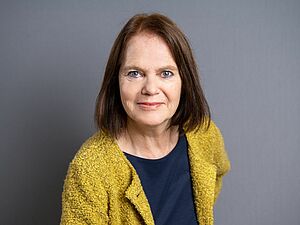"Everything is connected, especially in organic farming”
50th anniversary voices
Claudia Friedl is an environmental scientist, and politician – she joined the Swiss National Council as a member of the Social Democratic Party in 2013 – and has been a member of the Foundation Council of FiBL Switzerland since 2014.
During my biology studies at the University of Zurich, I was excited by the variety of topics this field of study entailed. I decided to go into plant physiology. After graduating, I had the opportunity to join Eawag, the Swiss Federal Institute of Aquatic Science and Technology, as a research assistant. I was tasked with the question of how much residual water is necessary to maintain the species composition of macroinvertebrates – small organisms that colonise the riverbed. Fascinated by the interaction of biological, physical and chemical parameters, I researched brown trout's population dynamics for my dissertation.
Why am I going so far out on a tangent? Because I see parallels with FiBL: Eawag was a relatively small research institution, just like FiBL. People knew each other across departments, which made it easier for the researchers to come together. New thinking and synergies emerged, which resulted in interesting forms of collaboration. This is precisely what makes FiBL so attractive as a research institute. When, nearly ten years ago, I was asked if I would like to join the FiBL Foundation Council as a member of the National Council, I was on board immediately. My affinity for agricultural research lies precisely in the fact that nothing can be considered in isolation; everything is connected, especially in organic farming.
I was completely taken by a lecture by Martin Ott, the former President of the Foundation Council, for many years. He illustrated how originally small, diverse farms have become homogenised across the regions, be it in terms of farming techniques or standardising the diversity of species and varieties. Today, this uniformity extends across entire continents. FiBL is taking a stand against this. However, it's not a step backward, it's an important step forward: understanding as much as possible about nature and about the interactions between matter, plants, animals, human interventions and climatic changes. What I find particularly important is that FiBL quickly transfers its research results to farmers and also makes them available to conventional agriculture. All this while being internationally connected.
FiBL has grown a lot in recent years, partly thanks to financial support from the federal government. Thus, the Swiss Confederation explicitly strengthens organic agriculture and shows that it is relying on FiBL as an internationally recognized research institute. I hope that FiBL can continue to cultivate and strengthen its innovative, open-minded, interdisciplinary approach to research. This would actually be a great start to the next 50 successful years.




